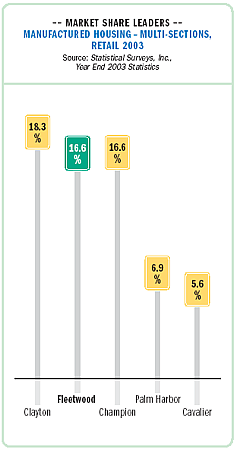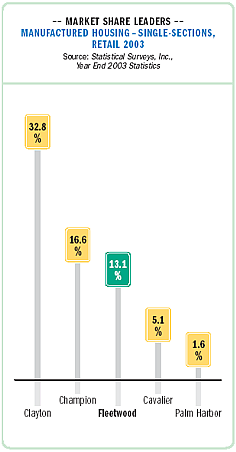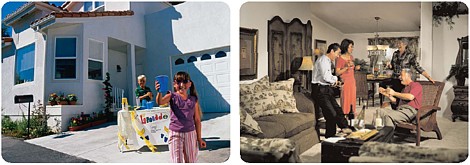
|
Fiscal year revenues of $783 million included wholesale factory sales of $540 million to independent dealers and retail sales of $243 million by Fleetwood Retail Corp., or FRC. Wholesale revenue for the year was down just 1 percent to $657 million, including sales of $117 million to Company-operated retail stores.
Both the wholesale, or manufacturing, division and the retail division saw substantial financial improvements over the prior year. The Housing Group lost $28.8 million during the year at the operating line, a 50 percent improvement compared with a loss of $57.6 million last year, after deducting intercompany profit on retail inventory of $1.6 million and $5.6 million, respectively. The wholesale division earned $5.4 million in operating income, while the retail division lost $35.9 million, compared to losses of $13.5 million and $49.7 million in fiscal 2003, respectively.
|

|


|

|
Improvements in wholesale labor efficiencies, manufacturing overhead, and quality, combined with a successful reorganization of the service organization, were the primary factors in the transition to profitability. Both higher home prices and reduced expenses drove the retail division’s financial improvement, even though 277 fewer homes were sold. The average new-home selling price at FRC increased by 10 percent, and selling, general and administrative expenses dropped by $15 million, or 15 percent, from the prior year.
EFFECTIVE OPERATING STRATEGIES PROVIDE A COMPETITIVE ADVANTAGE
Fleetwood has pursued a strategy of vertical integration to combat the effects of our industry’s down cycles and further capitalize on its up cycles. We are continuing to create and utilize synergies among our manufacturing, retailing, and financing divisions, and are now the only national, publicly traded company to operate in all three areas. We expect our efforts will result in a more stable wholesale distribution network and consistent availability of financing.
Vertical integration provides a variety of competitive advantages among the three divisions. Wholesale operations benefit by having a steady customer in FRC, which today represents almost 18 percent of Fleetwood’s production. Our wholesale division also garners insights about customer behaviors and demands from its sister company, learning quickly what does and doesn’t work out in the field, which, in turn, improves our product offerings to independent dealers. And our finance arm, HomeOne Credit Corp., should help our wholesale operations by smoothing out finance-related industry cycles.
FRC also gains from having a single, related supplier – 99 percent of new inventory is Fleetwood product – by realizing a steady supply of product and having a ready and willing recipient of product enhancement ideas. A special floorplan, the Inspiration Home, has been developed for sale exclusively through our Company-operated sales centers. HomeOne provides our retail division with access to competitive loans for their customers, and a staff trained to make decisions based on individual circumstances rather than inflexible matrices.
HomeOne also has advantages over independent lenders because of its association with the rest of the Housing Group. The business model offers synergies that enhance both retail operations and the performance of the loan portfolio. The retail general managers participate in the finance income as long as the loans are performing. This encourages an active participation in customer payment collection activities. Additionally, when loans default, the retail managers realize the economic loss from the loan, which encourages them to minimize repossession and refurbishment costs, and maximize the resale sale price. The result is superior portfolio performance and manageable loan servicing costs.
Finally, we believe that HomeOne will provide our wholesale division with a competitive advantage by further strengthening our retailer relationships. In the fourth quarter of fiscal 2004, HomeOne began extending finance programs to a select group of independent retailers in our wholesale division’s Pinnacle Program. Pinnacle retailers, who agree to sell Fleetwood products exclusively, receive valuable marketing support and training from Fleetwood in return. These new finance programs also provide HomeOne with another source of growth.

|

A FOCUS ON FINANCING EXPANDS OUR OPPORTUNITIES
Fleetwood was founded in 1950 to build travel trailers, which over time evolved into both the modern, recreational vehicle version, and into manufactured housing. Manufacturing a quality, high-value product and distributing it through independent dealers was the business model that enabled the Company to grow. Although our commitment to providing our customers with the best value in affordable housing never wavered, the industry changed.
The Company entered the retail business in 1998. This move was made largely to prevent the decimation of our independent dealer network by two of our competitors who had determined that the fastest way to build an internal, quality network of retailers was to buy our independent dealers. We made 26 acquisitions – most notably HomeUSA, a public consortium of housing retailers with 68 locations – and by 1999 we had opened an additional 75 greenfield centers. That year we initiated a central finance platform to pave the way toward financing our own customers.
As it happened, 1999 was the height of the manufactured housing market. We built FRC up to 244 retail stores by October 2000, but then began downsizing. Over the next three and a half years, consolidation was key. We closed unprofitable stores at the same time that we pursued the goal of centralizing the operations.
|

